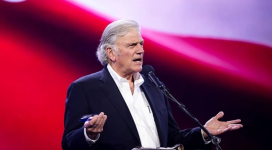The YMCA has unveiled a new brand strategy to extend its reach into communities to nurture the potential of youth and teens, improve the nation’s health and well-being and provide opportunities to support neighbors.
The new brand strategy, the first in 43 years, was introduced at a National Press Club event last Monday that included leaders from the philanthropic and nonprofit communities.
Along with the strategy, the YMCA unveiled a new, more forward-looking logo that it says reflects the vibrancy and diversity of the organization.
In another major change, the nonprofit will be calling itself “the Y” to align with how people most commonly refer to the organization.
“This is a very important, exciting time for the Y,” said Neil Nicoll, president and CEO of YMCA of the USA. “For 160 years, we’ve focused on changing lives for the better. Our commitment to building greater awareness for the important work we do will enable us to expand our efforts and further strengthen communities across the country.”
Though some have suggested that the nonprofit’s change to “the Y” is part of a subtle effort to de-emphasize the organization’s Christian roots, or the “C,” leaders within the organization say the change doesn’t make it any less Christian.
“We are still very much committed to our mission of putting Christian principles into practice through programs that build a healthy spirit, mind and body for all,” remarked Woody Fitton, Great Miami Valley Y president and chief executive officer, according to the Middletown Journal in Ohio.
"We are a faith-based organization. We will remain so," added John Bickley, president of the YMCA of Central Ohio, according to the Columbus Dispatch.
That's "reflected by the fact that we are open to all," he added.
Founded in 1844 by farmer-turned-department store worker George Williams, the Young Men’s Christian Association grew from Bible study and prayer group for young men into the nation’s leading nonprofit committed to helping people and communities to “learn, grow and thrive.”
Its stated mission is to “put Christian principles into practice through programs that build healthy spirit, mind and body for all.”
Today, “the Y” engages more than 10,000 neighborhoods across the United States through its 2,687 centers.
“We are changing how we talk about ourselves so that people better understand the benefits of engaging with the Y,” said Kate Coleman, senior vice president and chief marketing officer of YMCA of the USA, in explaining the nonprofit’s new strategy.
“We are simplifying how we describe the programs we offer so that it is immediately apparent that everything we do is designed to nurture the potential of children and teens, improve health and well-being and support our neighbors and the larger community,” she stated.
According to the Y, the organization’s former logo had been in place since 1967 and was its sixth since its inception.
The new logo’s “bold, active and welcoming shape,” officials say, symbolizes the Y’s commitment to personal and social progress.
The national resource office, YMCA of the USA, has already begun the transition to the new brand. Ys across the country, meanwhile, are expected to transition fully within five years.







